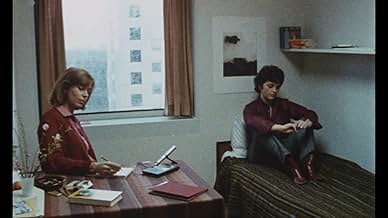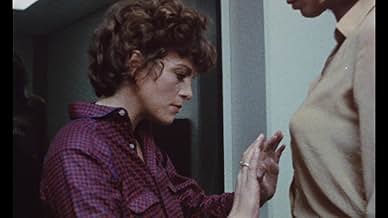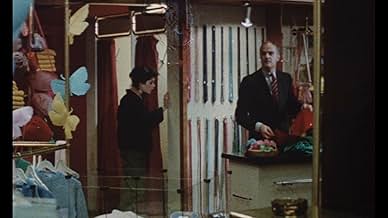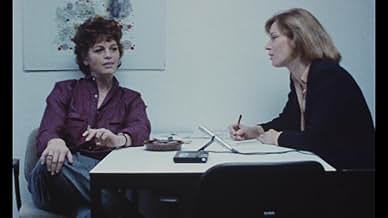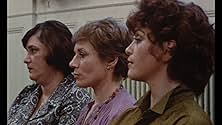NOTE IMDb
6,7/10
1,3 k
MA NOTE
Ajouter une intrigue dans votre langueThree women of no previous acquaintance suddenly kill a male shopkeeper in the middle of the day. The female psychiatrist assigned to the case sets out to understand why.Three women of no previous acquaintance suddenly kill a male shopkeeper in the middle of the day. The female psychiatrist assigned to the case sets out to understand why.Three women of no previous acquaintance suddenly kill a male shopkeeper in the middle of the day. The female psychiatrist assigned to the case sets out to understand why.
- Réalisation
- Scénario
- Casting principal
- Récompenses
- 3 victoires et 2 nominations au total
Eddie Brugman
- Echtgenoot
- (as Eddy Brugman)
Avis à la une
I just watched this film for a law class and wanted to briefly defend it, in light of the previously posted comment by another user.
I think the comparison of feminist reaction to male dominance in this movie, with anti-Semitism of the Nazi era, is inappropriate and not logically founded. Anti-Semitism and Jewish persecution in Nazi Germany was an example of social/religious bigotry, intolerance, and violence perpetrated by the political majority against a political and religious minority. It was based on a history of escalating persecution spanning centuries. By contrast, this movie concerns the emergent hostile sentiments of a social/political minority group, to their perceived oppression by the social/political majority.
The movie dates from the 1980's and perhaps both suffers and benefits from this fact -- it looks somewhat dated, but the social climate of that era is important to understanding the movie. Europe of the 1970s and 1980s, much like the US, was still very resistant to even the idea that sexism really existed or was a problem. The courts were actively fleshing out the parameters of sexual rights and protections -- legally carving out the nuances of sexual harassment, sex discrimination, and reproductive choice law.
The film is basically an extended commentary, arguably controversial, on the repression of women in a male dominated society. In this regard, the message is possibly too strongly stated -- three women, having finally had enough of silently accepting sexism and male domination, suddenly snap and brutally murder a male sales clerk in cold blood. They feel no remorse, and no men in the movie can even begin to comprehend the very idea of sexism or its effect on women. However, to compare the feminist sentiments of the film to Nazi-ism, is not only unfair, but is an offensive and reactionary over-statement of disagreement with these same feminist sentiments.
I think the comparison of feminist reaction to male dominance in this movie, with anti-Semitism of the Nazi era, is inappropriate and not logically founded. Anti-Semitism and Jewish persecution in Nazi Germany was an example of social/religious bigotry, intolerance, and violence perpetrated by the political majority against a political and religious minority. It was based on a history of escalating persecution spanning centuries. By contrast, this movie concerns the emergent hostile sentiments of a social/political minority group, to their perceived oppression by the social/political majority.
The movie dates from the 1980's and perhaps both suffers and benefits from this fact -- it looks somewhat dated, but the social climate of that era is important to understanding the movie. Europe of the 1970s and 1980s, much like the US, was still very resistant to even the idea that sexism really existed or was a problem. The courts were actively fleshing out the parameters of sexual rights and protections -- legally carving out the nuances of sexual harassment, sex discrimination, and reproductive choice law.
The film is basically an extended commentary, arguably controversial, on the repression of women in a male dominated society. In this regard, the message is possibly too strongly stated -- three women, having finally had enough of silently accepting sexism and male domination, suddenly snap and brutally murder a male sales clerk in cold blood. They feel no remorse, and no men in the movie can even begin to comprehend the very idea of sexism or its effect on women. However, to compare the feminist sentiments of the film to Nazi-ism, is not only unfair, but is an offensive and reactionary over-statement of disagreement with these same feminist sentiments.
Very powerful and thoughtful. Much superior to Gorris' more-acclaimed Antonia's Line, in my opinion. This film has none of the cutesiness of Antonia but all of the thoughtfulness and thematic weight. The theme is a subtle examination of the roles of men and women in Dutch society, and I guess it could apply to many societies. The film has a viewpoint, but it problematizes and complicates matters so that it's impossible for the viewer to blindly accept that viewpoint. It examines SUBTLE discrimination and dehumanization.
The only frustration I had was the fact that the copy I viewed did not give subtitles to a lot of the dialogue--e.g., a woman listens to the radio for about a minute, but non-Dutch speakers (like myself) don't understand any of it, and I'm guessing that with a filmmaker as careful as Gorris, this dialogue is important.
The only frustration I had was the fact that the copy I viewed did not give subtitles to a lot of the dialogue--e.g., a woman listens to the radio for about a minute, but non-Dutch speakers (like myself) don't understand any of it, and I'm guessing that with a filmmaker as careful as Gorris, this dialogue is important.
9SM-4
A Question of Silence is a moving film about three women who commit a horrible, violent crime and about the establishment's attempts to understand their motive. Without forethought and without knowing one another, they attack and kill a boutique owner in cold blood. The film follows the psychiatrist (played by Cox Habbema) as she interviews the incarcerated women. The major conflict comes from the women's refusal to state their motive, whence the title. Everyone assumes they must be insane, because to admit otherwise (and this is the conclusion to which the psychiatrist finally comes) is to admit that the world is a very bad place for women, indeed.
The film is hard to watch, especially, I would imagine, for men. But it by no means glorifies the murder or the murderers. Nor do the murderers find "overwhelming public support" at their trial. What they find is willful incomprehension on the part of the men who arrest them, try them and testify against them. Because what they have done cannot be understood in the context of any existing cultural system, including language, the women can only laugh as their sentence is pronounced. Their laughter is frightening, irrational and yet somehow gives shape to a different kind of logic.
The film is hard to watch, especially, I would imagine, for men. But it by no means glorifies the murder or the murderers. Nor do the murderers find "overwhelming public support" at their trial. What they find is willful incomprehension on the part of the men who arrest them, try them and testify against them. Because what they have done cannot be understood in the context of any existing cultural system, including language, the women can only laugh as their sentence is pronounced. Their laughter is frightening, irrational and yet somehow gives shape to a different kind of logic.
To call this movie hate literature is one thing, but the analogy used referencing Jews and Nazis is completely not applicable here. This is a film about power, domination, and oppression, all three of which men exercise over women in our society. One would have to live in a bubble to say that Jews hold the same position over non-Jews or Nazis (or did pre-WWII)! As a Jew, I find your comment mildly offensive, and as a man (while it is always difficult to recognize one's privilege), I find this film to be an amazing critique of patriarchy. While murder may not be the solution, this film shows the extraordinary way in which 3 women who have been beaten down their whole lives (and have nothing to lose) attempt to fight back against an enemy that is unbeatable. The laughter at the end of this film proves just who gets it and who doesn't. PS- I've heard that in some places during the initial screenings of this film, women in the theaters actually broke out in laughter with the women on screen during the court scene....
The misunderstanding of this controversial film often comes from the misconception that feminism hates men. The plot of three women killing a man in a boutique is indeed based on an actual event (although the victim in the news was a young woman). In this film, Marleen Gorris studies the extreme behaviour, relating it to the male-dominant legal system that does not give much room for studying people's feelings. If one can see that Gorris' position is more with the pyschiatrist who is sympathetic with the case rather than promoting hatred, it is not hard to see why Los Angeles Times considered the film as a subversive movie in the best sense of the word.
Le saviez-vous
- AnecdotesThe first plant that Nelly Frijda throws during her tantrum can be seen hitting the lens of the camera.
Meilleurs choix
Connectez-vous pour évaluer et suivre la liste de favoris afin de recevoir des recommandations personnalisées
- How long is A Question of Silence?Alimenté par Alexa
Détails
Box-office
- Budget
- 300 000 NLG (estimé)
Contribuer à cette page
Suggérer une modification ou ajouter du contenu manquant

Lacune principale
By what name was Le Silence Autour de Christine M. (1982) officially released in India in English?
Répondre
